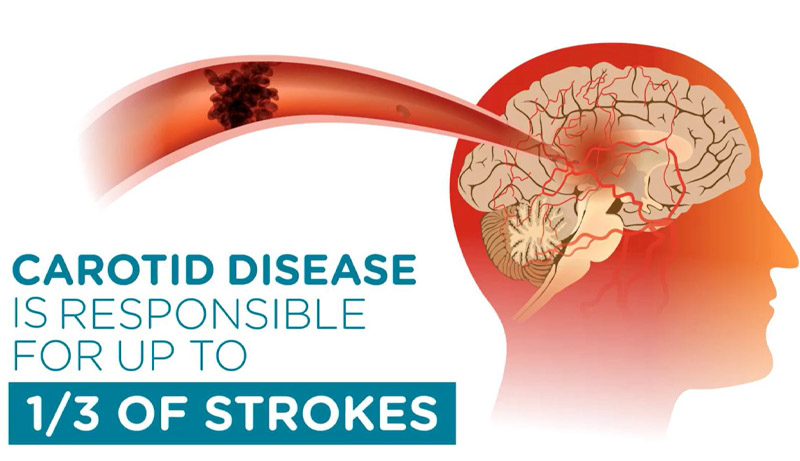
Every year, 15 million people worldwide suffer a stroke. Nearly 5 million die and another 5 million are left permanently disabled. While it is widely known that stroke is caused by high blood pressure, high cholesterol, smoking, obesity, and diabetes, a lesser-known condition is screened for in the fight against stroke: carotid artery disease (CAD).
Shore Medical Center is proud to now offer the latest treatment for carotid artery disease, TransCarotid Artery Revascularization (TCAR), a minimally invasive procedure clinically proven to lower patients’ risk for stroke with a faster recovery, less pain, and smaller scars.
CAD Screening
Carotid artery disease is a form of atherosclerosis or a plaque build-up in one or both of the neck’s main arteries. The carotid arteries are vital as they feed oxygen-rich blood to the brain. When plaque builds up in the carotid arteries, they begin to narrow and slow down blood flow, potentially causing a stroke if blood flow stops or plaque fragments travel to the brain.
Unfortunately, carotid artery disease often goes unnoticed as it typically lacks symptoms. You may have noticed your doctor listening to your carotid arteries with a stethoscope to determine if the blood is flowing properly, or if it is making a whooshing sound indicative of a narrowing or blockage. If you have hypertension, diabetes, obesity, or a history of smoking, you are at risk for CAD and may benefit from a diagnostic test like carotid artery ultrasound and angiography. You should talk to your doctor about getting screened. Shore Physicians Group’s Vascular Testing & Diagnostic Center at 649 Shore Road in Somers Point offers screening for CAD and other vascular conditions.
CAD Treatment
If you are diagnosed with carotid artery disease, your doctor will discuss treatment options with you. Treatment options for carotid artery disease depend upon the severity of the overall patient condition and symptoms. Moderate disease may not require an interventional procedure, as some individuals can manage the disease with medications and lifestyle changes. More severe blockages may require surgery.
Today, there are three primary surgical approaches:
- Carotid Endarterectomy (CEA): This open surgical procedure removes plaque from inside the carotid artery in order to restore normal blood flow to the brain. The surgeon makes an incision on the neck to access the affected artery, opens the artery and removes the plaque. The surgeon will then close the artery and the incision in the neck using stitches.
- Transfemoral Carotid Artery Stenting: In this minimally invasive alternative procedure, the physician works through a tube inserted into the artery in the upper thigh. First, a small umbrella-like filter is placed beyond the diseased area of the carotid artery to help limit fragments of plaque from traveling toward the brain during the procedure. The physician then inserts a slender, metal-mesh tube, called a stent, which expands inside the carotid artery to increase blood flow to the brain and stabilize the plaque. These treatment options have been shown to effectively treat the blockage; however, both options have limitations and carry a risk of stroke during the procedures themselves.
- A New Treatment Approach: TransCarotid Artery Revascularization (TCAR): TransCarotid Artery Revascularization (TCAR) is a hybrid procedure that was developed to treat patients with carotid artery disease who are at risk for open surgery. At Shore Medical Center, TCAR is performed by Vascular Surgeon Dr. Matthew Lawrence, of Shore Physicians Group Surgeons, a Penn Medicine Surgery affiliate.
TCAR is beneficial for many patients for a number of reasons:
- The entire TCAR procedure is performed through a smaller incision in the neck and in less than half the time of a carotid endarterectomy – limiting the stress on the heart and significantly cutting the risk of the patient having a stroke or heart attack during the procedure.
- During the TCAR procedure, a tube inserted into the carotid artery is connected to a system that temporarily directs blood flow away from the brain to protect against dangerous debris from reaching the brain and causing a stroke during the procedure. Surgeons filter the blood before returning it to a vein in the groin, and a stent is implanted to the carotid artery to stabilize plaque and help prevent future strokes.
- Patients who undergo the TCAR procedure recover quickly and almost always go home the next day to return to full and productive lives with less pain and smaller scars than traditional treatments, and a reduced risk of future strokes.
Over 70,000 procedures have been performed worldwide through clinical trial and commercial use. TCAR has been studied extensively, and the clinical data have been excellent. Click here for more information.










